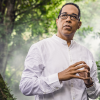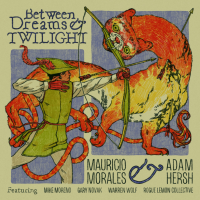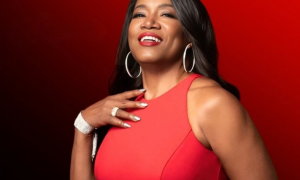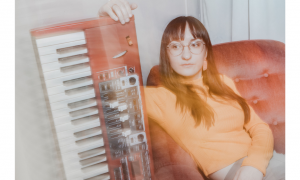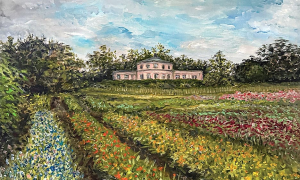
Musicians reach a fluency in performance through their connection with the artfrom; for the most proficient artists, music is completely ingrained into every aspect of their life. In many cases, this total immersion in music happens at a young age, through the influence of a family member of close friend. The young person hears music on a constant basis, exposing them to the ideas, techniques, and artistic concepts of history's great musicians. Musical creation becomes a fun and recurring activity that always seems natural, pressure free, and personal. The step into professional work holds extra responsibilities, but it's simply a natural progression, the next step in their destiny. For these musicians, music is more than a pastime, an interest, or even a career—it's an essential piece of their lives.
Pianist Danilo Pérez spent his youth completely connected to music through every aspect of his life, setting the stage for his prolific career. Born in Panama in 1965, Pérez was heavily influenced by his father, an active singer on the lively local music scene. The Pérez household was filled with a constant stream of attention grabbing music, including Cuban legends, Puerto Rican salsa, Panamanian music, and more. Pérez's father encouraged his son in music, singing to him and doing family performances. Pérez grew a deep love for music that took flight once his father introduced him to the National Conservatory, where young Pérez soon began formal studies. Professional pianist Edgardo Quintero helped moved Pérez forward at the conservatory and eventually hired the young pianist as a member of his dance orchestra. Pérez built his skills working alongside the area's best musicians, often supporting international stars that visited Panama. Although he spent most nights entrenched in dance music, Pérez was fascinated by local jazz musicians and started hearing classic recordings from friends. Encouraged by his mother to establish a stable career outside music, Pérez worked double time, earning a technical degree in electronics while continuing his studies at the conservatory. Seeking a higher proficiency in electronics, Pérez enrolled at the local university, but music soon became his primary focus. Realizing the pull of music, the young pianist left the university, earned a Fullbright Scholarship, and saved money for college. After much hard work, Pérez packed his bags for the United States, where he would start his path towards a musical career at Indiana University in Pennsylvania.
Music was an essential part of Pérez's life as a young person; it grabbed him in a big way and wouldn't let go. This connection to the art form fueled the passion that would drive to the top of today's jazz world. In the first piece of our extensive interview with Pérez, we take a look at the influence of his father upon his young musical life, the impact of Panama's lively music scene, and the beginning of Pérez's career as a professional.
LATIN JAZZ CORNER: I know that your father was a musician and that he got you into music at a young age. What was he doing and how did that influence you?
DANILO PEREZ: He's a singer. He's not active anymore, but when I was a kid, he was very active. My father introduced me to the love of music and the passion. I would see that he would do it all day. I was inspired to see him playing, so he started getting me these instruments. He got me these little bongos when I was three years old. He bought me bongos, cowbells, and other percussion instruments. I was imitating him with the guitar, and I started to love it. He had me learning the melodies; he would sing one melody and then he would ask me to sing the second line. It was that kind of training.
We would be at home all day doing music. Music was sort of like integrated in our daily life. Sometimes I didn't like certain courses in the school, so he would take the time to put lyrics to that. That became the basis of a lot of how I teach and how I do it nowadays—putting lyrics to things. I do remember some of the things had so much impact.
LJC: What sorts of music were you hearing around you at the time?
DP: It was a mix of a lot of styles. It was from Louie Armstrong's “Hello Dolly" to El Gran Combo, La Sonora Matancera—a lot of the great Cuban groups. My father had a very broad taste. He would play Venezuelan music, Brazilian music, and I remember very clearly Celia Cruz. He liked piano players a lot, including a lot of the traditional pianists. He loved Bebo Valdés. There would be everything, like pieces from Peru, standards from Colombia, standards from Panama. I remember it being broad, but definitely integrated throughout the whole day. You would have the Gran Combo playing, La Sonora Matancera, the new Fania All-Star record, Ruben Blades, and then the traditional ballad singers—it was a pretty wild thing. He was very open.
Panama is very cosmopolitan, so it's very diverse. He sang Cuban influenced music and traditional things. He had the chance to work with Peruchin, with Beny More, with Ismael Rivera, with the heaviest, heaviest people, because he was part of that scene singing with the orquestas. He really knew the great stuff that was amazing. From early on, he would say listen to this, listen to that, and he would point out little details. I remember meeting Orlando Contreras, who was a great Cuban singer when I was very young.
My father saw that I was getting really interested. We would play on mother's day—I would play guitar, he sang, and I sang with him. It became a family thing. We really enjoyed doing that. One day he passed me by the school of music—the conservatory. It was very smart of my father. He said, “Look, this is the school where people go and study when they want to get serious." He just passed by the school and said that. I thought about it for half an hour, and it was like, “I want to go back there, I want to be serious!"
So at an early age, I wanted to go there to the conservatory. I met one of my father's dear friends at the conservatory, his name is Edgardo Quintero. He was also very influential for me because he did a lot of things that seemed abnormal. He was transcribing without the piano, he was writing arrangements, he was teaching solfege. I was kind of taken under his wing at the conservatory, along with all the great musicians.
While I was at the conservatory, I heard that professor Edgardo Quintero was making an orchestra for the Union Club, which was the very high, prestigious society venue. He asked me if my father was still singing, and I was like, “Yea!" But my father had quit! He was still singing, but not professionally that much. My father came and he hired him immediately. He remembered him, and he got the gig. I got the same gig playing bongos and cowbell. By doing that, I went to another level of admiring and seeing people because at a very early age, I was already playing with professional musicians and having a great director like Edgardo Quintero. We alternated with famous orquestas from Ruben Blades and Willie Colon, Roberto Roena, Ismael Miranda, and then Sonora Ponceña with Papo Lucca. My life kind of took a hit when I heard Papo soloing.
LJC: Is that what got you turned on to playing piano?
DP: I was already studying at the conservatory. My father got me interested because he loved Peruchin. Peruchin lived in Panama for many years and Beny More too. That was basically what was happening, a lot of the great Cuban musicians were stationed in Panama. Also Ismael Rivera, the great sonero from Puerto Rico, was there; he was the one that Beny More said was the best sonero ever.
There was a lot of musicians before and during the time that I grew up, so there were a lot of opportunities to play in orquestas and have those experiences. The thing about that moment in Panama is that the top professional musicians were teaching at the conservatory. They were very well educated in traditional classical music, but they were also educated in popular music. So that brought an element that was a very important one—you'd be working with your teacher and then you'd have to take a class in the afternoon with him. It was no problem.
LJC: Was jazz around you at all?
DP: I was exposed, I always loved it. There was a scene led by a fantastic pianist whose name was Victor Boa. They had a nice scene. It was actually a scene where Carlos Garnett came from and other Panamanian jazz musicians like Jorge Silvestre. They would be playing jazz in the afternoons at the Union Club. I really dug it. My father started explaining to me who was who. My father always liked the solos. Like when somebody would be playing salsa and then a saxophone solo would come in, he would love it. He would sing it back.
One of the members of our orquesta was Reggie Johnson. He had a sound like Paul Desmond, but the phrasing was a little bit like some of those older Cuban saxophonists. He would be playing, then there was an open solo, and he would come in with all these phrases. I was like, “Wow!" I loved it! Then I would go to the piano and get it. Hearing that every night, that's how I got my interest.
The area where we lived, Altos de Cerro Viento, was an urban low-middle class area; it was a very modest upbringing. When we moved to this area, there was a neighbor who was working at the canal. He was a jazz lover—his name is Dennis Noel. That's where my whole fever became real—the temperature raised up. He was playing all these records—Wes Montgomery, Freddie Hubbard, and he would be like, “Man, listen to this!" Then he would play it really loud. It was funny, where we lived, every house had a style. One neighbor would be playing merengue, salsa, very traditional, tipico. But he was blowing Freddie Hubbard really hard! It was great. That was my foundation.
My mother was really concerned that I was falling in love with music too much. She was concerned about me having a career, which is normal in Latin America especially. It's not like here, where they parents pay all this money for their kids to go to school. She was very worried about it, and she was really concerned. She's very strong; she would say, “I'm really worried, I don't want you to study, you're getting too into music . . ." She would tell my father, “Please tell him how you did it—you did music part time." My father went into the world of pedagogy and became a teacher and all of that. I was like, “Well, there's not enough hours in the day, I really need to practice." She was like, “No, no no . . . “ We made a deal. She said, “O.K., I will let you study music, but you also need to study a career." So I said, “O.K." What I liked at that moment was electronics.
So I went into studying electronics and kept developing my music career. I went to the conservatory and got really serious with the piano. I had a great teacher from Chile. I started working with groups and I started playing around. Then I got a chance to work with a great singer from Puerto Rico, his name was Danny Rivera. He came to Panama and he wanted to take me. Willie Chirino hired me—I worked with a lot of the really famous Latin stars of that moment.
I started really early in school—my mother had an aunt that taught me. She had us writing and reading; we passed the first grade early, and we were ahead, always underage in our classes. With the training of my father, I put music to everything. Things were really easy for me—school was never that hard. I was advancing pretty fast, and I finished high school when I was about 16 years old. In some schools, you could finish high school with a degree—this was just in some schools, not all of them; this one was very specific to electronics. I was already working with T.V.s and working with radios. I finished high school with a bachelor's degree—here in the United States, that would be like a technician. I could either work if I had to, or I could continue taking my engineering.
So I went to university; my mother was very happy. I started studying at the university, but at this moment, things were starting to happen more in music for me. I was doing commercials and T.V. I started really becoming very active in the professional world. People were calling me, it became very difficult to balance out.
Then one day, I was in the middle of a test and I had this vision. I saw myself playing on stage and people applauding. So I decided not to finish my exam. I left and I started looking for help—trying to find a way to leave Panama and come to the United States to study. That brought me to the U.S. Embassy which had a program called the Fullbright. I got the Fullbright to come to Indiana University in Pennsylvania. Once I got it, I told my mother that I was not going to continue with engineering and that I was going to commit to studying abroad. She had a rough time with it; she said, “But we don't have any money to send you." I said, “Don't worry, I'm going to work." I got a lot of gigs; I was working all day and all night. I put my money together and that's how I left.
Pianist Danilo Pérez spent his youth completely connected to music through every aspect of his life, setting the stage for his prolific career. Born in Panama in 1965, Pérez was heavily influenced by his father, an active singer on the lively local music scene. The Pérez household was filled with a constant stream of attention grabbing music, including Cuban legends, Puerto Rican salsa, Panamanian music, and more. Pérez's father encouraged his son in music, singing to him and doing family performances. Pérez grew a deep love for music that took flight once his father introduced him to the National Conservatory, where young Pérez soon began formal studies. Professional pianist Edgardo Quintero helped moved Pérez forward at the conservatory and eventually hired the young pianist as a member of his dance orchestra. Pérez built his skills working alongside the area's best musicians, often supporting international stars that visited Panama. Although he spent most nights entrenched in dance music, Pérez was fascinated by local jazz musicians and started hearing classic recordings from friends. Encouraged by his mother to establish a stable career outside music, Pérez worked double time, earning a technical degree in electronics while continuing his studies at the conservatory. Seeking a higher proficiency in electronics, Pérez enrolled at the local university, but music soon became his primary focus. Realizing the pull of music, the young pianist left the university, earned a Fullbright Scholarship, and saved money for college. After much hard work, Pérez packed his bags for the United States, where he would start his path towards a musical career at Indiana University in Pennsylvania.
Music was an essential part of Pérez's life as a young person; it grabbed him in a big way and wouldn't let go. This connection to the art form fueled the passion that would drive to the top of today's jazz world. In the first piece of our extensive interview with Pérez, we take a look at the influence of his father upon his young musical life, the impact of Panama's lively music scene, and the beginning of Pérez's career as a professional.
LATIN JAZZ CORNER: I know that your father was a musician and that he got you into music at a young age. What was he doing and how did that influence you?
DANILO PEREZ: He's a singer. He's not active anymore, but when I was a kid, he was very active. My father introduced me to the love of music and the passion. I would see that he would do it all day. I was inspired to see him playing, so he started getting me these instruments. He got me these little bongos when I was three years old. He bought me bongos, cowbells, and other percussion instruments. I was imitating him with the guitar, and I started to love it. He had me learning the melodies; he would sing one melody and then he would ask me to sing the second line. It was that kind of training.
We would be at home all day doing music. Music was sort of like integrated in our daily life. Sometimes I didn't like certain courses in the school, so he would take the time to put lyrics to that. That became the basis of a lot of how I teach and how I do it nowadays—putting lyrics to things. I do remember some of the things had so much impact.
LJC: What sorts of music were you hearing around you at the time?
DP: It was a mix of a lot of styles. It was from Louie Armstrong's “Hello Dolly" to El Gran Combo, La Sonora Matancera—a lot of the great Cuban groups. My father had a very broad taste. He would play Venezuelan music, Brazilian music, and I remember very clearly Celia Cruz. He liked piano players a lot, including a lot of the traditional pianists. He loved Bebo Valdés. There would be everything, like pieces from Peru, standards from Colombia, standards from Panama. I remember it being broad, but definitely integrated throughout the whole day. You would have the Gran Combo playing, La Sonora Matancera, the new Fania All-Star record, Ruben Blades, and then the traditional ballad singers—it was a pretty wild thing. He was very open.
Panama is very cosmopolitan, so it's very diverse. He sang Cuban influenced music and traditional things. He had the chance to work with Peruchin, with Beny More, with Ismael Rivera, with the heaviest, heaviest people, because he was part of that scene singing with the orquestas. He really knew the great stuff that was amazing. From early on, he would say listen to this, listen to that, and he would point out little details. I remember meeting Orlando Contreras, who was a great Cuban singer when I was very young.
My father saw that I was getting really interested. We would play on mother's day—I would play guitar, he sang, and I sang with him. It became a family thing. We really enjoyed doing that. One day he passed me by the school of music—the conservatory. It was very smart of my father. He said, “Look, this is the school where people go and study when they want to get serious." He just passed by the school and said that. I thought about it for half an hour, and it was like, “I want to go back there, I want to be serious!"
So at an early age, I wanted to go there to the conservatory. I met one of my father's dear friends at the conservatory, his name is Edgardo Quintero. He was also very influential for me because he did a lot of things that seemed abnormal. He was transcribing without the piano, he was writing arrangements, he was teaching solfege. I was kind of taken under his wing at the conservatory, along with all the great musicians.
While I was at the conservatory, I heard that professor Edgardo Quintero was making an orchestra for the Union Club, which was the very high, prestigious society venue. He asked me if my father was still singing, and I was like, “Yea!" But my father had quit! He was still singing, but not professionally that much. My father came and he hired him immediately. He remembered him, and he got the gig. I got the same gig playing bongos and cowbell. By doing that, I went to another level of admiring and seeing people because at a very early age, I was already playing with professional musicians and having a great director like Edgardo Quintero. We alternated with famous orquestas from Ruben Blades and Willie Colon, Roberto Roena, Ismael Miranda, and then Sonora Ponceña with Papo Lucca. My life kind of took a hit when I heard Papo soloing.
LJC: Is that what got you turned on to playing piano?
DP: I was already studying at the conservatory. My father got me interested because he loved Peruchin. Peruchin lived in Panama for many years and Beny More too. That was basically what was happening, a lot of the great Cuban musicians were stationed in Panama. Also Ismael Rivera, the great sonero from Puerto Rico, was there; he was the one that Beny More said was the best sonero ever.
There was a lot of musicians before and during the time that I grew up, so there were a lot of opportunities to play in orquestas and have those experiences. The thing about that moment in Panama is that the top professional musicians were teaching at the conservatory. They were very well educated in traditional classical music, but they were also educated in popular music. So that brought an element that was a very important one—you'd be working with your teacher and then you'd have to take a class in the afternoon with him. It was no problem.
LJC: Was jazz around you at all?
DP: I was exposed, I always loved it. There was a scene led by a fantastic pianist whose name was Victor Boa. They had a nice scene. It was actually a scene where Carlos Garnett came from and other Panamanian jazz musicians like Jorge Silvestre. They would be playing jazz in the afternoons at the Union Club. I really dug it. My father started explaining to me who was who. My father always liked the solos. Like when somebody would be playing salsa and then a saxophone solo would come in, he would love it. He would sing it back.
One of the members of our orquesta was Reggie Johnson. He had a sound like Paul Desmond, but the phrasing was a little bit like some of those older Cuban saxophonists. He would be playing, then there was an open solo, and he would come in with all these phrases. I was like, “Wow!" I loved it! Then I would go to the piano and get it. Hearing that every night, that's how I got my interest.
The area where we lived, Altos de Cerro Viento, was an urban low-middle class area; it was a very modest upbringing. When we moved to this area, there was a neighbor who was working at the canal. He was a jazz lover—his name is Dennis Noel. That's where my whole fever became real—the temperature raised up. He was playing all these records—Wes Montgomery, Freddie Hubbard, and he would be like, “Man, listen to this!" Then he would play it really loud. It was funny, where we lived, every house had a style. One neighbor would be playing merengue, salsa, very traditional, tipico. But he was blowing Freddie Hubbard really hard! It was great. That was my foundation.
My mother was really concerned that I was falling in love with music too much. She was concerned about me having a career, which is normal in Latin America especially. It's not like here, where they parents pay all this money for their kids to go to school. She was very worried about it, and she was really concerned. She's very strong; she would say, “I'm really worried, I don't want you to study, you're getting too into music . . ." She would tell my father, “Please tell him how you did it—you did music part time." My father went into the world of pedagogy and became a teacher and all of that. I was like, “Well, there's not enough hours in the day, I really need to practice." She was like, “No, no no . . . “ We made a deal. She said, “O.K., I will let you study music, but you also need to study a career." So I said, “O.K." What I liked at that moment was electronics.
So I went into studying electronics and kept developing my music career. I went to the conservatory and got really serious with the piano. I had a great teacher from Chile. I started working with groups and I started playing around. Then I got a chance to work with a great singer from Puerto Rico, his name was Danny Rivera. He came to Panama and he wanted to take me. Willie Chirino hired me—I worked with a lot of the really famous Latin stars of that moment.
I started really early in school—my mother had an aunt that taught me. She had us writing and reading; we passed the first grade early, and we were ahead, always underage in our classes. With the training of my father, I put music to everything. Things were really easy for me—school was never that hard. I was advancing pretty fast, and I finished high school when I was about 16 years old. In some schools, you could finish high school with a degree—this was just in some schools, not all of them; this one was very specific to electronics. I was already working with T.V.s and working with radios. I finished high school with a bachelor's degree—here in the United States, that would be like a technician. I could either work if I had to, or I could continue taking my engineering.
So I went to university; my mother was very happy. I started studying at the university, but at this moment, things were starting to happen more in music for me. I was doing commercials and T.V. I started really becoming very active in the professional world. People were calling me, it became very difficult to balance out.
Then one day, I was in the middle of a test and I had this vision. I saw myself playing on stage and people applauding. So I decided not to finish my exam. I left and I started looking for help—trying to find a way to leave Panama and come to the United States to study. That brought me to the U.S. Embassy which had a program called the Fullbright. I got the Fullbright to come to Indiana University in Pennsylvania. Once I got it, I told my mother that I was not going to continue with engineering and that I was going to commit to studying abroad. She had a rough time with it; she said, “But we don't have any money to send you." I said, “Don't worry, I'm going to work." I got a lot of gigs; I was working all day and all night. I put my money together and that's how I left.


